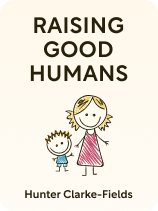

This article is an excerpt from the Shortform book guide to "Raising Good Humans" by Hunter Clark-Fields. Shortform has the world's best summaries and analyses of books you should be reading.
Like this article? Sign up for a free trial here.
Why doesn’t yelling work when teaching your child right from wrong? How can you communicate to your child with respect?
If you want to be closer to your child, communicate with them respectfully. They may be younger and smaller than you, but when you talk to them like adults, they’ll show the same respect back.
Take a look at essential parenting communication skills you need to pick up on.
Communicate Respectfully
Clarke-Fields says that when you’re frustrated, it’s tempting to communicate in ways that emphasize your power in the relationship—demanding, threatening, or dismissing—to get your kid to comply with your request. However, these approaches often signal to your child that they’re a problem to be fixed rather than a person with their own thoughts and feelings, which will hurt your relationship over time.
| Communicate Your Expectations While it’s important to communicate respectfully with your children, Adele Faber and Elaine Mazlish, authors of How to Talk So Kids Will Listen and Listen So Kids Will Talk, explain that it’s equally important to set clear expectations for kids. This involves outlining specific rules and boundaries so that children understand what is expected of them. According to Faber and Mazlish, clear expectations help children feel more secure and confident, as they know exactly what behaviors are acceptable and which ones are not. Furthermore, having a consistent framework of expectations can also prevent misunderstandings and reduce the likelihood of conflicts. When children are aware of the established guidelines, they’re better equipped to make informed decisions and take responsibility for their actions. |
Clarke-Fields writes that to shift away from these counterproductive patterns, use parenting communication skills that refocus requests on “I” statements rather than “you” accusations. Express your own unmet needs instead of attributing blame. For example, instead of yelling “No yelling,” you could say, “When you yell, I feel overwhelmed and can’t focus.” This strategy both allows you to advocate for your needs and serves as a vital lesson for your child. It teaches them to consider how their actions impact others. It also gives them a model to name what they’re feeling when their needs aren’t met.
(Shortform note: “I-messages” were popularized by Thomas Gordon, a clinical psychologist, in his book Parent Effectiveness Training (1970). Gordon introduced the concept as a communication tool to help parents express their feelings and needs in a non-confrontational and empathetic manner. The idea behind “I-messages” is that by focusing on one’s own feelings rather than criticizing or blaming the other person (“You-messages”), parents can foster more open, respectful, and effective communication with their children. This technique has since been widely adopted in various contexts beyond parenting, such as in education, counseling, and conflict resolution.)
Clarke-Fields acknowledges that “I-messages” are not perfect tools, but as you use them more, your child will learn they can trust you to treat them with respect and consideration and will be more willing to cooperate. She advises being patient when adopting new communication strategies as it may take time to build back trust with your kid.
(Shortform note: Using “I-messages” fosters trust and models respectful communication, tapping into the concept of mirror neurons—brain cells that fire both when an action is performed and when it is observed. By consistently using “I statements,” you’re essentially demonstrating how to express feelings and needs without blame, which your child then mirrors. This method doesn’t just mend trust; it actively teaches empathy and emotional intelligence, crucial skills for cooperative interactions.)

———End of Preview———
Like what you just read? Read the rest of the world's best book summary and analysis of Hunter Clark-Fields's "Raising Good Humans" at Shortform.
Here's what you'll find in our full Raising Good Humans summary:
- How to use mindfulness to manage emotions—both yours and your child's
- Four steps to resolving conflicts with your child
- Practical strategies for creating a simple, low-stress environment at home





